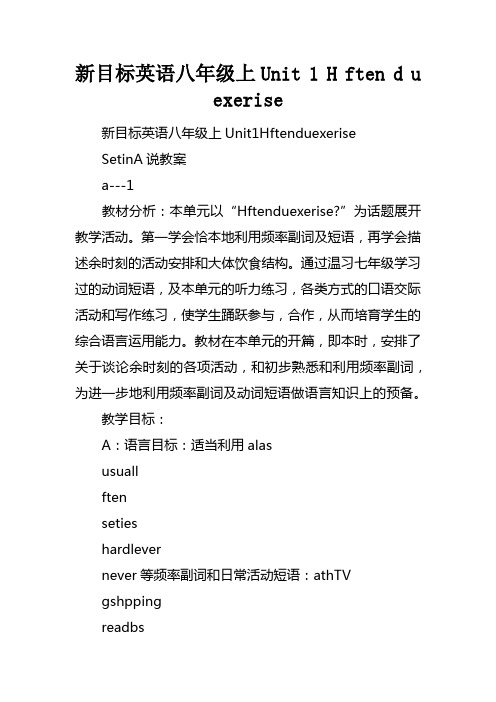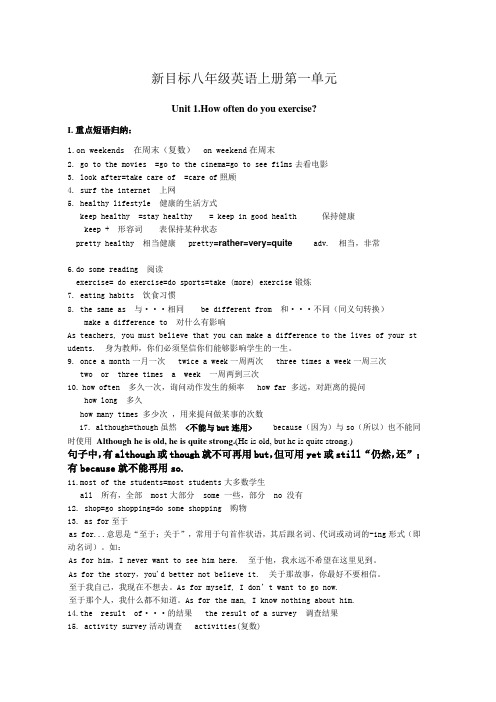新目标初二英语上《unit1Howoftendoyouexercise》PPT课件
新目标英语八年级上Unit 1 How often do you exercise

新目标英语八年级上Unit 1 How often doyou exercise新目标英语八年级上Unit 1 How often do you exA说课教案1a ---1c教材分析:本单元以“How often do you exercise ?”为话题展开教学活动。
首先学会恰当地使用频率副词及短语,再学会描述课余时间的活动安排和基本饮食结构。
通过复习七年级学习过的动词短语,及本单元的听力练习,各种方式的口语交际活动和写作练习,使学生积极参与,合作,从而培养学生的综合语言运用能力。
教材在本单元的开篇,即本课时,安排了关于谈论课余时间的各项活动,以及初步认识和使用频率副词,为进一步地使用频率副词及动词短语做语言知识上的准备。
教学目标:A:语言目标:恰当使用always usuallardly ever never 等频率副词和日常活动短语:watch TV gg read books exercise等。
掌握句型: What do you usually do on weekends?I often gvWhat ddo on weekends ?gvB:能力目标:学习描述课余时间的活动安排,初步培养学生的语言综合运用能力。
C:德育目标:培养学生的逻辑表述能力,激发学生的积极思维,并使学生互相了解,增进友谊,加强人际交往,以形成良好的人际关系。
教学重点:核心句型: What do you usually do on weekends?I often gv教学难点:第三人称单数谓语动词在此核心句型中的运用。
教学用具:词汇卡片多媒体课件一套教学过程:Warm-up activ(1) Do it (学生按教师的指令做动作)T:Read books. / Do homework!/ Draw pictures/ Look at the blackboardT: run / stop / stand up / sit down.(2) Do as I do.(学生跟老师边说边做动作)I read bweekends.I run on weekends.I dwork on weekend2 Revision anda(1)教师问:“What do you usually do on weekends ? ” (并且板书)让学生根据自己的实际回答I usually …… on weekends.(2)教师出示动词卡片 watch TV、read books 、exercise 、clean、skateboard、 play basketball、wash clothes、gg、 go to movies让学生认读。
新目标八年级英语上册Unit 1 How often do you exercise?讲解与练习

新目标八年级英语上册Unit 1 How often do you exercise?讲解与练习姓名班级讲解【重要词组】◆ how often 多久一次◆ as for至于,关于◆ junk food垃圾食品◆ eating habit饮食习惯◆ of course 当然◆ look after照顾,照看◆ go shopping去购物◆ go to the movies去看电影◆ once a week每周一次◆ hardly ever很少几乎从来不◆ twice a week每周两次◆ three times a week每周三次◆ watch TV看电视◆ on weekend在周末◆ do homework做作业◆ a lot of许多◆ try to do试图(努力)做某事◆ help sb (to) do sth.帮助某人做某事◆ the same as和……相同◆ keep in good health保持身体健康【重要词句详解】1. Let’s look at the followi ng words and their usage(让我们看看下面的这些词及其用法).always一直,总是; usually 通常; often 经常 sometimes; 有时候hardly eve很少,几乎没有 ; never 从不这些词都是表示频率的副词, 但是在程度上有差别。
通常用于一般现在时。
如:I always have some milk for my breakfast. 我早餐总是喝牛奶。
He usually gets up at 6:30 in the morning. 他通常早上6:30起床。
He often does homework before dinner time. 他经常晚餐前做作业。
He sometimes goes to movies on Friday evening. 他有时周五晚上去看电影。
八年级英语上册Unit 1 How often do you exercise 人教新目标版

八年级英语Unit 1 How often do you exercise? 人教新目标版【本讲教育信息】一. 教学内容:Unit 1 How often do you exercise?[学习过程]一. 单元内容:How often do you exercise?二. 单元目标:1. Wh- 问句2. How often……?问句3. 表示频率的副词4. 不定代词all, most, some, none的用法。
三. 重点单词:always adv. 总是usually adv. 通常often adv. 经常sometimes adv. 有时hardly ever 几乎不曾;很少never adv. 从不exercise v. 锻炼n. 练习shop v. 购物n. 商店skateboarding n. 溜滑板运动once adv. 一次twice adv. 两次three times a week 一周三次every day 每天milk n. 牛奶junk food 垃圾食品drink v. 喝. n. 饮料四. 重点短语how often 多长时间一次 a lot of 许多look after 照料try to do sth 尽力去做某事start with 以……开始as for 至于make a difference 有重要性do exercise 做运动surf the internet 上网五. 重点句子1. What do you usually do on weekends?周末你通常做什么?I usually play soccer.我经常踢足球。
2. What do they do on weekends?他们周末干什么?They often go to the movies.他们经常去看电影。
3. What does he do on weekends?他周末干什么?He sometimes watches TV.他有时候看电视。
八年级英语新目标上Unit1Howoftendoyouexercise课件

1 b.___watch TV
once a week
twice a week three times a week
c.___shop 5 d.___exercise 4
once a month
2 e.___read
twice a month Match his activities with the number of times
He
She
sometimes hardly ever
watches TV.
watches TV.
Mon
Tue
Wed ★
Thur
Fri ★
Sat
Sun ★
swim
watch TV
read books exercise
★
★ ★ ★
★
★ ★
★
★ ★
How often do you swim ? once a week
100% 80%
60% 40% 20% 0% never hardly ever sometimes often usually always
He
usually always never often
exercises.
She
He She
goes shopping.
goes shopping. goes skateboarding.
Homework
What do you often do in your free time? Do you help your mom do housework? What do you often do at home? How often do you……? Write a short passage, and tell us your hobby.
新目标英语八年级(上)unit1howoftendoyouexercise

11 八年级(上)英语教学案系列 编号:120901 班级: 姓名:课题:Unit 1 How often do you exercise?主备:胡发坤 审核: 时间:2012年9月 第1周第一课时 Section A (1a-2c)学习目标:1. 会读会写P1~2生词;2. 了解并且掌握频率副词的用法;3. 学习掌握重要句型;1)–What do you usually do on weekends? -- I often go to the movies.2)–How often do you watch TV? -- Twice a week.学习重、难点:1.频率词汇及询问活动频率; 2.一般现在时态的熟练运用。
一、课堂前置1. 自学本课P1~2词汇,并熟记。
2. 朗读P1~2教材,理解句子、对话,完成以下内容。
1) 1a,列举周末的不同活动,完成1a 。
2)了解下列频率副词,写出其汉意。
always (100%)_______ usually (80%) often (30-50%)______sometimes (20%)_____ hardly ever(5%)_______ never (0%)3) 朗读P1,1c ,翻译下列词组,结合1a 图片,编写对话。
(参照下列短语)go to the movies watch take /do exercisesurf the Internet play soccer do homeworkdo some reading do some shopping do some cleaninggo skateboarding go swimming go shopping4) 一般现在时标志词有哪些?二、学习探究1. 小组内互相检查、交流课堂前置的预习情况。
2. 完成听力1b 。
3. 1c, 用不同人称编对话,展示对话。
4. 完成2a, 2b 听力。
新目标英语八年级上Unit1Howoftendoyouexercise

新目标英语八年级上Unit 1 H ften d uexerise新目标英语八年级上Unit1HftenduexeriseSetinA说教案a---1教材分析:本单元以“Hftenduexerise?”为话题展开教学活动。
第一学会恰本地利用频率副词及短语,再学会描述余时刻的活动安排和大体饮食结构。
通过温习七年级学习过的动词短语,及本单元的听力练习,各类方式的口语交际活动和写作练习,使学生踊跃参与,合作,从而培育学生的综合语言运用能力。
教材在本单元的开篇,即本时,安排了关于谈论余时刻的各项活动,和初步熟悉和利用频率副词,为进一步地利用频率副词及动词短语做语言知识上的预备。
教学目标:A:语言目标:适当利用alasusuallftensetieshardlevernever等频率副词和日常活动短语:athTVgshppingreadbsexerise等。
把握句型:hatduusualldneeends?Iftengtthevieshatdesshedneeends?SheftengesttheviesB:能力目标:学习描述余时刻的活动安排,初步培育学生的语言综合运用能力。
:德育目标:培育学生的逻辑表述能力,激发学生的踊跃思维,并使学生相互了解,增进友谊,增强人际交往,以形成良好的人际关系。
教学重点:核心句型:hatduusualldneeends?Iftengtthevies教学难点:第三人称单数谓语动词在此核心句型中的运用。
教学用具:辞汇卡片多媒体一套教学进程:Step1ar-upativitiesDitT:Readbs/Dher!/Drapitures/LattheblabardT:run/stp/standup/sitdnDasId(学生跟教师边说边做动作)IreadbsneeendsIrunneeendsIdherneeendsStep2Revisinandpresentatin教师问:“hatduusualldneeends?”让学生依照自己的实际回答Iusuall……neeends教师出示动词卡片athTV、readbs、exerise、lean、satebard、plabasetball、ashlthes、gshpping、gtvies让学生认读。
新目标八年级上Unit1 How often do you exercise课件

math Every day
gym class
art
music
Twice a week Once a week Twice a week
Every summer
Twice a week
Every winter
Every morning
Once a week
Three times a year
What did they see? They saw themselves on TV. They are very Twice a week surprised at it. How often do they watch TV? Twice a week .
Where does she come from?
What is Susan doing?
She is doing some reading.
How often does she read? She often reads after class.
often
Oh, I know why she is good at writing. Because she often practices reading. So my Chinese teacher always says good words about her.
What is Tommy doing?
He is playing the trumpet.
How often does he play the trumpet?
Once a week
Once a week.
What are the ducks doing?
They are watching TV.
新目标英语八年级上Unit 1 How often do you exercise

新目标英语八年级上Unit 1 How often do you exerciseUnit 1 How often do you exercise?Teaching Aims and Demands1)Knowledge ObjectsIn this unit students learn to talk about how often they do things.2)Ability ObjectsTo improve students’ ability of listening, speaking, reading, writing and communication. 3)Moral ObjectsTo help students form a good eating habit.To do exercise every day and keep fit.Teaching Key PointTo master the key vocabulary and the target language presented in this unit.Teaching DifficultyTo train students how to use the key vocabulary and the target language by reading and writing. Studying WaysTeach students how to use context and do a survey.Language FunctionTalk about how often you do things.Target LanguageWhat do you usually do on weekends? I sometimes go to the beach.How often do you eat vegetables? Every day.Most of the students do homework every day.StructuresWh-questionsWhat do…?How often …?Adverbs of frequencyAll / most / some / noneLearning StrategiesUsing context.Transforming information.The First PeriodTeaching Aims and Demands1)Knowledge ObjectsNames of activities.Adverbs of frequency.What do you usually do on weekends? I often go to the movies.2)Ability ObjectsWriting and listening skills.Communicative competence.3)Moral ObjectKeep a diary every day in English.Teaching Key PointKey vocabulary.Teaching Difficultiesalways, usually, often, sometimes, hardly, ever, neverWhat does she do on weekends? She often goes to the movies.Teaching MethodsDiscover method.Listening and writing methods.Pairwork.Teaching AidsA tape recorder, a large monthly calendar, a projector.Teaching ProceduresStep 1 Greet the classSay: Good morning, I’ll introduce myself first. I’ll be your English teacher this term. Do you like English? I hope we’ll get along very well. I’m not only your teacher, but can be your friends. We’ll be happy together. Now let’s begin. This class we’ll learn Unit 1. How often do you exercise? Please open your books at page 1.Step 2 Section A 1aFirst look at the picture. Ask a few students to say what they see in the thought bubbles. Each thought bubble shows something a person does on weekends. Then name each activity. Ask students to report each one.e.g. One girl is shopping. Another girl is reading. This boy is exercising. Another boy iswatching TV. These girls are skateboarding.Point out the sample answer. Then ask students to list all the activities in the thought bubbles. Then ask the students who finish first to write the answers. Check the answers and ask the students to correct their own activities.Step 3 1bDisplay a large calendar that shows the days of the week. Tell students Saturday and Sunday are the weekend. Then show three new words and read.Point to each scene in Activity 1a. Ask students to look at each picture and tell what the person does on weekends.Listen to the conversation. The people are talking about what they do on weekends. Please listen to the recording and write the letter of one activity after the word in the list. Make sure each student understands what to do. Then play the recording for the first time. Students only listen. Then play it a second time. This time ask students to complete the activity in individually. Then check the answers with the whole class.注意频率副词在句中有不同的位置.1. 在be 动词之后:e.g. I’m usually ill on planes.Are you usually at home on Monday?He isn’t usually ill on planes.2. 在实意动词之前:e.g. I usually work on Friday.I sometimes go to London.First ask two students to read the sample in speech bubbles. Work with a partner. Make your own conversations about the people in the picture. Then have students work in pairs. Then ask some pairs to present their conversations to the class.Step 5 SummaryThis class we’ve learnt some names of activities, and we also learnt some adverbs of frequency: always, usually, often, sometimes, hardly, ever, never.Step 6 HomeworkKeep a weekend diary showing what you do on weekend. You can write down what they do from the time you get up until you go to sleep. I’ll ask you to read your diaries to the class.The Second PeriodTeaching Aims and Demands1)Knowledge ObjectsAdverbs of frequency.Names of activities.Wh-questions and answers.2)Ability ObjectsWriting, reading and listening skills.Communicative competence.3)Moral ObjectDo more exercise and keep healthy.Teaching Key PointKey vocabulary.Teaching DifficultiesHow often do you watch TV? Twice a week.What does he do on weekends? He sometimes watches TV.How often does Chung watch TV? He watches TV twice a week.Teaching MethodsDiscover method.Listening and reading methods.Pairwork.Communicative approach.Teaching AidsA tape recorder, some color paper.Teaching ProceduresStep 1 Check the homework.Show the new words on the screen and teach students how to read. And ask them to repeat.surf the Internet 网上冲浪Step 3 2aLook at the list of activities and read. Say, This is an interview about what a boy names Chung usually does. Listen to the recording and number the activities. Play the recording for the first time. Students only listen. Then play it a second time. This time ask students to number the activity they hear. Then check the answers with the whole class.Step 4 2bSay, Look at the heading How often? In the chart in Activity 2a and read. We’ll listen to the recording again. This time please listen to the conversation and draw a line from the activity to the time statement that tells how often Chung does that activity. Play the recording. Ask students to draw lines between the activities and the time statements. Then play it again, and ask students to check their answers.Step 5 2c PairworkFirst ask a student to read the list of activities and check that all the students understand the vocabulary. Say, Now tell me how often you do these activities. You can write your answers under the list of How often. Then ask students to look at the sample conversation and read the conversation. Make conversations like this about the activities in Activity 2c. Later I’ll ask some of you to present your dialogues to the class.Step 6 An activity: How often?Give students some color paper and ask them to write five statements about how often they do different activities.e.g. I play soccer three times a week. I visit the doctor twice a year.Ask students to write the activities in one column and list the “how often” statements in random order in another place on the color paper. Then ask a student to show her/his lists and say her/his statements. Class members see if they can make correct statements about the student using one item from each list.Step 7 Grammar FocusWhat do you usually do on weekends? I usually play soccer.What do they do on weekends? They often go to the movies.What does he do on weekends? He sometimes watches TV.How often do you shop? I shop once a month.How often does Chung watch TV? He watches TV twice a week.Step 8 SummaryThis class we’ve learnt some adverbs of frequency and we learnt to talk about how often people do things. And also we had a game.Step 9 HomeworkAfter class have more practice and keep a diary and remember to exercise every day. This can help you to build your body strong and keep fit.The Third PeriodTeaching Aims and Demands1)Knowledge ObjectsA magazine article.How often do you read English books?I like reading. I read English books about twice a week.2)Ability ObjectsWriting and reading skills.Communicative competence.3)Moral ObjectStudy hard and to be a good student.Teaching Key PointsHow often do you read English books? I read English books about twice a week.Teaching DifficultyA magazine article.Teaching MethodsWriting and reading methods.Groupwork.Communicative approach.Teaching AidA projector.Teaching ProceduresStep 1 RevisionAsk the students to write down some sentences about how often they do things.Step 2 New wordsShow the new words on the screen and teach students how to read. And ask them to repeat.as for 至于;关于Step 3 3Open the books at page 3. Look at 3 first and read each line of the survey. Say, This survey shows how often Green High School students exercise, how often they do homework and how often they watch TV. What activity do ninety-five percent of students do homework every day. Yes, do homework. Ninety-five percent of students do homework every day.Ask the students to tell something else about the chart.Vocabulary KeyAll students = 100% Most students = 51% ~99%Some students = 1% ~50% No students = 0Tell them most students means more than half. Some students means less than half.Look at the magazine article. Read and ask the students to look at the survey and fill in the blanks in the article individually. Then check the answers.all, most , some和none的用法。
新目标八年级上Unit 1 How often do you exercisePPT课件

Bill, you try to ….
2020年10月2日
9
Is Bill’s lifestyle the same as yours or different? What’ your lifestyle?
2020年10月2日
10
You are a reporter of ‘China Sports’. Now your editor asks you to write an
3
How are your eating habits?
activities Every Three or four Once or twice a
day times a week week
Eat
4✓分 3分
1分
vegetables
Eat fruit 4分 3分
1分
✓
Drink milk 4分 3分
unhealthy
2020年10月2日
7
According to the chart,can you finish Bill’s letter?根据表格,完成Bill的这封信。
activities
How often
exercise
hardly every
eat vegetables twice a week
article about Liu Xiang’s lifestyle.
你是一名中国体育的记者,现在主编要你写一篇 关于刘翔的生活习惯的文章.
2020年10月2日
11
Early to bed and early to rise
makes a man healthy, wealthy and wise. 早睡早起身体好。
八年级英语新目标上Unit 1-How often do you exercise?课件

go to the moviesexerciseHow oftenevery dayA:How often do you watch TV?
B:I watch TV every day.
A:What’s favorite program?
B:It’s Animal World.
B:She often goes to the movies.2cPAIRWORK
How often do you do these activities?
Fill in the chart andthen make conversations.ActivitieswatchTV
surf thBiblioteka Internet八年级英语新目标上Unit 1:How often do you
exercise?课件
Unit 1Howoftendoyouexercise?
课件制作人:王泽健SECTIONALanguageGoal:TalkaboutHowoftenYou
dothings1aLookatthepicture.Makealistofthedifferentweekend
activities.12345skateboarding
do somereadexercisewatchTV
go shopping1cPAIRWORK
Talk about the people in the picture above.
What do they do on weekends?
A:What does she do on weekends?
to help you.
What Do Students Do atGreen High School?
unit1howoftendoyouexercise人教新目标八年级上微课课件

watch TV 网 上 冲 浪 surf the internet
read English books go to the movies
exercake three drills with “how often”. 2.用英语描述自己的生活作息习贯. You can choose any one of them .
C
3.Read the magazine article ,then fill
in
the article. All students=100%全部学生 Most students=51%___99%大多数学 生 Some students=1%-----5%某些学生 No students=0%没有学生
Exercises;
1.Chinese eat meals three times a day . (就划线部份提问) ____________________________________ 2.They like surfing the internet .(变为否认句) ___________________ 3it’s ten o’clock.(就划线部份提问) ___________________ 4.We study at school from Monday to Friday. (就划线部份 提问)
______________________________________ 5.Most students can sing English songs. (就划线部份提问)
___________________________ _
1b; listen and write the letters prom the picture above on the lines below.
新目标八年级英语上册unit1

新目标八年级英语上册第一单元Unit 1.How often do you exercise?I. 重点短语归纳:1.on weekends 在周末(复数) on weekend在周末2. go to the movies =go to the cinema=go to see films去看电影3. look after=take care of =care of照顾4. surf the internet 上网5. healthy lifestyle 健康的生活方式keep healthy =stay healthy = keep in good health 保持健康keep + 形容词表保持某种状态pretty healthy 相当健康 pretty=rather=very=quite adv. 相当,非常6.do some reading 阅读exercise= do exercise=do sports=take (more) exercise锻炼7. eating habits 饮食习惯8. the same as 与···相同 be different from 和···不同(同义句转换)make a difference to 对什么有影响As teachers, you must believe that you can make a difference to the lives of your st udents. 身为教师,你们必须坚信你们能够影响学生的一生。
9. once a month一月一次 twice a week一周两次 three times a week一周三次two or three times a week 一周两到三次10.how often 多久一次,询问动作发生的频率 how far 多远,对距离的提问how long 多久how many times 多少次,用来提问做某事的次数17. although=though虽然 <不能与but连用> because(因为)与so(所以)也不能同时使用Although he is old, he is quite strong.(He is old, but he is quite strong.)句子中,有although或though就不可再用but,但可用yet或still“仍然,还”;有because就不能再用so.11.most of the students=most students大多数学生all 所有,全部 most大部分 some 一些,部分 no 没有12. shop=go shopping=do some shopping 购物13. as for至于as for...意思是“至于;关于”,常用于句首作状语,其后跟名词、代词或动词的-ing形式(即动名词)。
